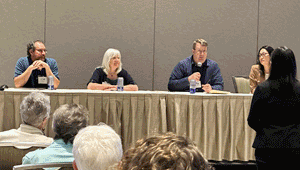Can preventing hearing loss reduce dementia risk?

New research from Linda McEvoy, PhD, helps explain how hearing loss affects the brain
Many people lose some hearing with age, as cells within the ears change. More than half of adults over age 70 have some degree of hearing loss. Hearing impairment is also linked to higher dementia risk, but researchers don't yet know exactly why there is a connection. Linda McEvoy, PhD, a senior investigator at Kaiser Permanente Washington Health Research Institute (KPWHRI), leads research looking at changes in the brain associated with hearing impairment in order to better understand whether preventing hearing loss could also reduce the risk of dementia.
In a recent study, published in the Journal of Alzheimer’s Disease, McEvoy and collaborators found that participants with hearing loss had small changes in areas of the brain that are used for processing sound and for controlling attention. The results support the theory that our brains compensate for hearing loss by working harder, and doing so might make them less resilient to diseases like Alzheimer’s.
"One of the interesting things about this study is that we saw differences in the brain not just in auditory areas, but in areas of the frontal lobe that are associated with other cognitive functions, like attentional control," McEvoy said. "If the association is causal — meaning that hearing loss caused those changes — it suggests that interventions to help reduce the cognitive effort of understanding speech in people with hearing impairment could help protect the brain."
Differences in brain structure
McEvoy conducted the research at University of California San Diego, where she is professor emeritus with the Herbert Wertheim School of Public Health and Human Longevity Science. The study included 130 participants from UC San Diego’s Rancho Bernardo Study of Healthy Aging, a longitudinal cohort study that began in 1972. Participants had their hearing measured and also had brain MRIs. Half had some degree of hearing impairment at their baseline visit. Those with hearing impairment were older, more likely to be men, and more likely to have hypertension.
The researchers found that in the brains of participants with hearing loss, there were small differences in the structure of areas of the temporal and frontal cortex that are used for processing and understanding sounds and speech. They also saw these small differences in areas of the brain used for controlling attention. Although the study only shows a correlation, and does not show that hearing loss caused these changes, it's a step toward identifying the connection between hearing loss and dementia.
"There are multiple theories about why we observe an association between hearing loss and dementia," McEvoy said. "Our study findings support the idea that hearing impairment requires our brain to work harder to compensate, leading to changes in structure. Some of the changes could also be due to sensory deprivation, since our brain isn't receiving as much auditory input. These changes could be making the brain more susceptible to cognitive decline."
Some people with hearing loss develop dementia, while others don't. Better understanding the association could help identify which, if any, interventions to protect against hearing loss have the most potential for reducing risk of dementia.
"I think the results we saw emphasize that it's important to protect your hearing," McEvoy said, "especially since hearing loss also impacts a person's quality of life." She suggested wearing ear protection in loud environments and avoiding long-term exposure to loud sounds as simple measures that anyone can take to protect their hearing. For people who already have some degree of hearing loss, tools like subtitles, voice-to-text apps, and hearing aids can reduce the work the brain has to do to compensate.
Next steps
McEvoy is a lead researcher for the Adult Changes in Thought (ACT) Study, where she plans to continue looking at this topic. The ACT Study has long-term data on over 5,800 participants. Volunteers join the study at age 65 or older and check in every 2 years. At every visit, they fill out a questionnaire that assesses the social and emotional impact of changes in their hearing.
"We are also planning on obtaining more comprehensive measures of hearing ability, beyond simply the ability to detect tones, which will allow us to better understand the connection between hearing ability and dementia risk. And, as we develop new noninvasive ways to detect pathologies in the brain, we'll be able to look at whether hearing impairment is related to Alzheimer's disease, or to other age-related diseases that affect the brain." McEvoy said. "I'm also interested in investigating what factors might protect someone with hearing loss from developing dementia."
This study was funded by the National Institute on Aging and the American Federation for Aging Research.
By Amelia Apfel
2023 ACT Symposium

Researchers gather to address critical topics in aging and dementia
The ACT Research Symposium returns with an in-person scientific forum.
Research

Latino families inform training for caregivers of people with dementia
Maggie Ramirez, PhD, and Robert Penfold, PhD, culturally adapt an online program.
Research

Dementia risk screening tool shows promise
In a new study, a tool to help discover undiagnosed dementia performed well in 2 separate health systems.



